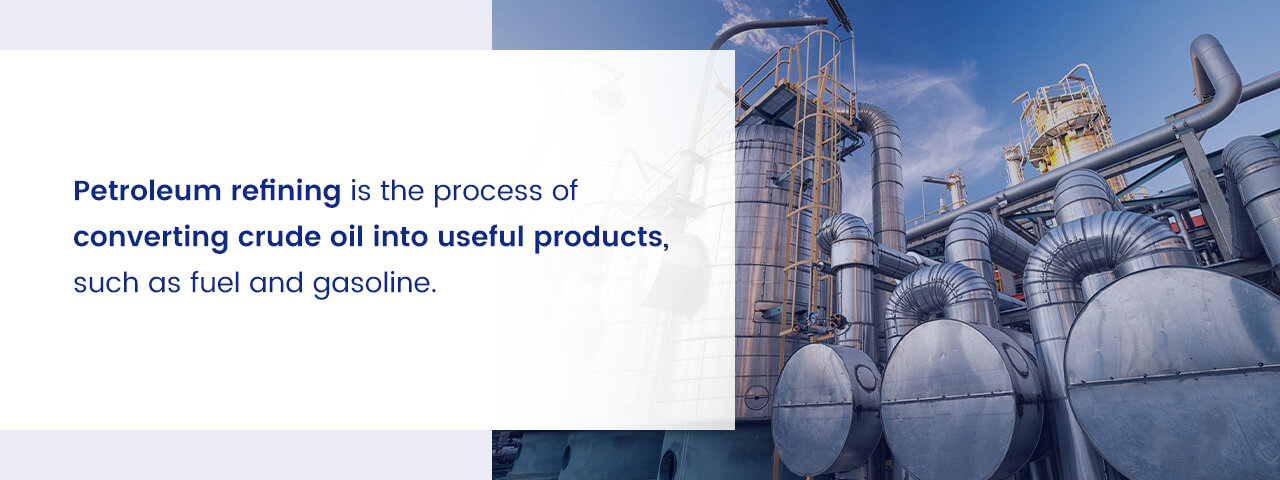March 3, 2025
Understanding Hydrogen Petroleum Refining
Hydrogen is the most abundant element in the world. It produces a chemical compound when combined with other elements. The most common example is when hydrogen combines with oxygen to form water.
As an energy carrier, hydrogen can transport usable energy from one source to another. When produced or separated from other sources, such as fossil fuels, during petroleum refining, it also serves as a source of energy or fuel.
What Is Hydrogen Petroleum Refining?
Petroleum refining is the process of converting crude oil into useful products, such as fuel and gasoline. Since hydrogen typically combines with other elements, refining is necessary to separate them. The two most common hydrogen refining methods are steam methane reforming (SMR) and electrolysis.

In the United States, SMR is the most widely used hydrogen refining technique. It’s a thermal process that uses steam from 700 to 1,0000 degrees Celsius to derive methane from natural gas. In SMR, steam reacts with hydrocarbon fuel to produce hydrogen.
Several types of hydrocarbon fuels can produce hydrogen. These include natural gas, renewable liquid fuels, diesel, gasified biomass and gasified coal. Most of the world’s hydrogen supply comes from steam-reforming natural gas.
How Is Hydrogen Used in Petroleum Refining?
The role of hydrogen in petroleum refining processes is critical. As the world’s demand for fuel continues to grow, so does the demand for hydrogen. Petroleum refineries use hydrogen to reduce the sulfur content of diesel fuels. High sulfur content in diesel fuels affects engine emissions and violates environmental regulations.
In 2022, the global demand for hydrogen was approximately 95 million tons. By 2023, the International Energy Agency estimated that the demand in 2030 would be 50% higher than the total forecast in the IEA’s Global Hydrogen Review 2022.
Applications of Hydrogen in Petroleum Refining
Hydrocracking and hydrotreating are the two primary applications of hydrogen in petroleum refining. Both processes use high-pressure hydrogen to achieve their respective results.
- Hydrocracking: Break down heavy and complex hydrocarbons like oil, and convert them into lighter ones. Hydrocracking is a catalytic cracking process meant to increase gasoline and jet fuel yields.
- Hydrotreating: Remove impurities from the hydrocarbon streams to make them cleaner and more efficient. Examples of contaminants are sulfur compounds, nitrogen and metals.
Using Hydrogen Filters in Hydrogen Petroleum Refining
Hydrogen filters are fast becoming a go-to solution for hydrogen production strategies. Their main purpose is to prevent the contamination of hydrogen and your system.
Hydrogen production methods such as SMR and electrolysis separate hydrogen and oxygen. The oxygen is then expelled into the atmosphere, while large amounts of water left over are used to produce a hydrogen product. Refineries use hydrogen filters to ensure a clean, safe and efficient refining process.
Types of High-Quality Hydrogen Filters
Chase Filters & Components produces high-quality hydrogen filters for various applications. These filters are ideal for use throughout the petroleum refining process, as well as in other industries. Some of the most popular hydrogen filters in our catalog are:
- HY31 Series In-Line Filters: Available in 316 (3K) and Nitronic 50 (up to 10K) specifications and flows up to 5500 SCFM.
- HY33 Series In-Line Filters: Available in 316 SS (15K) and Nitronic 50 (20K) PSI-rated operating pressure variants and flows up to 250 SCFM.
Purchase High-Quality Hydrogen Filters From Chase Filters & Components
Chase Filters & Components is the industry leader in filtration. We pride ourselves on carrying a wide selection of quality-made filters for different industries, including hydrogen filters, commercial filters, industrial filters, alternative fuel filters and hydraulic and pneumatic filters in various specifications.
Our team of experts is ready to answer all your queries and find the most suitable filters for your needs. Contact us today to learn more about our refining solutions.